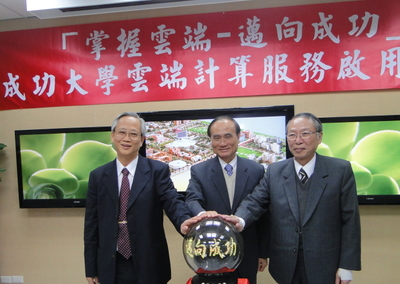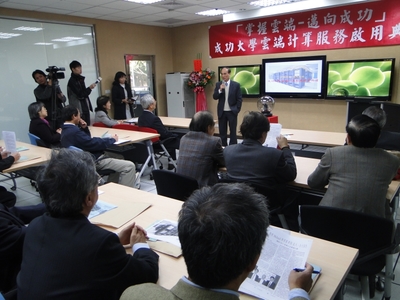NCKU Cloud Computing Service Initiates in January, 2011


Tainan, Taiwan, December 31st, 2010
Before the Cloud Computing Service of National Cheng Kung University (NCKU), Tainan, Taiwan, initiates in January, 2011, its inauguration ceremony is held at 9:30am, December 31st, in the first floor of Computing and Network Center, Cheng-Kung Campus.
After President Michael Ming-Chiao Lai, Senior Executive Vice-President Hwung-Hweng Hwung and Director Ce-Kuen Shieh of Computing and Network Center pressed the start button together in the inauguration ceremony, the first pay cloud computing service in Taiwan officially initiates.
Cloud computing is the most popular topic nowadays, and since the end of last year, the Ministry of Education, Taiwan, has incorporated cloud computing into E-campus key policy.
“It is a grand challenge for the Computing and Network Center to import cloud computing into existing school IT resources to engage in further integration and offer rental to patents in need. This act will give new life to existing IT investments, elevate utility rate and create additional revenue to achieve carbon reduction,” said NCKU President Michael Ming-Chiao Lai.
President Lai also mentioned, “Universities in Taiwan have been eagerly developing campus cloud computing system. Currently, the NCKU construction and development of cloud computing, including software and hardware facilities, have exceeded that of many universities.”
By mastering the trend of cloud computing and integrating various teaching and administrative resources to further create a better campus E-environment, which can effectively enhance the competitiveness of NCKU, teachers and students can enjoy the advantages and convenience brought by cloud computing.
President Lai commented in his final words, “The inauguration of the Cloud Computing Service on the last day of the year 2010 symbolizes that E-service at National Cheng Kung University has escaped the old framework and traditional thinking and is about to march into a new era of cloud computing.”
NCKU Senior Executive Vice-President Hwung-Hweng Hwung pointed out, “There are two categories of academic research, one is the demonstration of experimental capabilities and the other is theory. Prior to 1950, theories can be derived. After 1950, we entirely rely on calculation. Thus, nowadays, academic performance mainly focuses on the quality of core technologies and the power of calculation energy in school. In the past four years, with great support from President Lai, we have such an excellent Computing and Network Center. The effort of Director Shieh is significant as well.”
NCKU Director Ce-Kuen Shieh of Computing and Network Center revealed, “In the past, when professors carry out their research projects, they personally or they entrust stores outside the university to construct and maintain the system. The Cloud Computing Service established by the Computing and Network Center allows professors to select the service contents and start accessing them after payment, thus exempting issues of system and transportation maintenance.”
The cooperation between National Cheng Kung University and Microsoft Corporation employs the Microsoft MCloud program, introducing virtualization and encouraging professors and departments to rent Infrastructure as a Service (IaaS) service to engage in work such as research projects and website maintenance.
Starting on January 1st, 2011, NCKU Cloud Computing Service begins offering its five service contents to professors and departments, where they can choose their desired computing core, memory, storage space, operation system, applications and service quality and start using the service half an hour after the payment.
Cloud computing is Internet-based computing, whereby shared servers provide resources, software, and data to computers and other devices on demand, as with the electricity grid.
Cloud computing is a natural evolution of the widespread adoption of virtualization, service-oriented architecture and utility computing, where details are abstracted from consumers, who no longer have need for expertise in, or control over, the technology infrastructure “in the cloud” that supports them.
Before the Cloud Computing Service of National Cheng Kung University (NCKU), Tainan, Taiwan, initiates in January, 2011, its inauguration ceremony is held at 9:30am, December 31st, in the first floor of Computing and Network Center, Cheng-Kung Campus.
After President Michael Ming-Chiao Lai, Senior Executive Vice-President Hwung-Hweng Hwung and Director Ce-Kuen Shieh of Computing and Network Center pressed the start button together in the inauguration ceremony, the first pay cloud computing service in Taiwan officially initiates.
Cloud computing is the most popular topic nowadays, and since the end of last year, the Ministry of Education, Taiwan, has incorporated cloud computing into E-campus key policy.
“It is a grand challenge for the Computing and Network Center to import cloud computing into existing school IT resources to engage in further integration and offer rental to patents in need. This act will give new life to existing IT investments, elevate utility rate and create additional revenue to achieve carbon reduction,” said NCKU President Michael Ming-Chiao Lai.
President Lai also mentioned, “Universities in Taiwan have been eagerly developing campus cloud computing system. Currently, the NCKU construction and development of cloud computing, including software and hardware facilities, have exceeded that of many universities.”
By mastering the trend of cloud computing and integrating various teaching and administrative resources to further create a better campus E-environment, which can effectively enhance the competitiveness of NCKU, teachers and students can enjoy the advantages and convenience brought by cloud computing.
President Lai commented in his final words, “The inauguration of the Cloud Computing Service on the last day of the year 2010 symbolizes that E-service at National Cheng Kung University has escaped the old framework and traditional thinking and is about to march into a new era of cloud computing.”
NCKU Senior Executive Vice-President Hwung-Hweng Hwung pointed out, “There are two categories of academic research, one is the demonstration of experimental capabilities and the other is theory. Prior to 1950, theories can be derived. After 1950, we entirely rely on calculation. Thus, nowadays, academic performance mainly focuses on the quality of core technologies and the power of calculation energy in school. In the past four years, with great support from President Lai, we have such an excellent Computing and Network Center. The effort of Director Shieh is significant as well.”
NCKU Director Ce-Kuen Shieh of Computing and Network Center revealed, “In the past, when professors carry out their research projects, they personally or they entrust stores outside the university to construct and maintain the system. The Cloud Computing Service established by the Computing and Network Center allows professors to select the service contents and start accessing them after payment, thus exempting issues of system and transportation maintenance.”
The cooperation between National Cheng Kung University and Microsoft Corporation employs the Microsoft MCloud program, introducing virtualization and encouraging professors and departments to rent Infrastructure as a Service (IaaS) service to engage in work such as research projects and website maintenance.
Starting on January 1st, 2011, NCKU Cloud Computing Service begins offering its five service contents to professors and departments, where they can choose their desired computing core, memory, storage space, operation system, applications and service quality and start using the service half an hour after the payment.
Cloud computing is Internet-based computing, whereby shared servers provide resources, software, and data to computers and other devices on demand, as with the electricity grid.
Cloud computing is a natural evolution of the widespread adoption of virtualization, service-oriented architecture and utility computing, where details are abstracted from consumers, who no longer have need for expertise in, or control over, the technology infrastructure “in the cloud” that supports them.
Provider:
新聞中心
Date:
100-01-03



